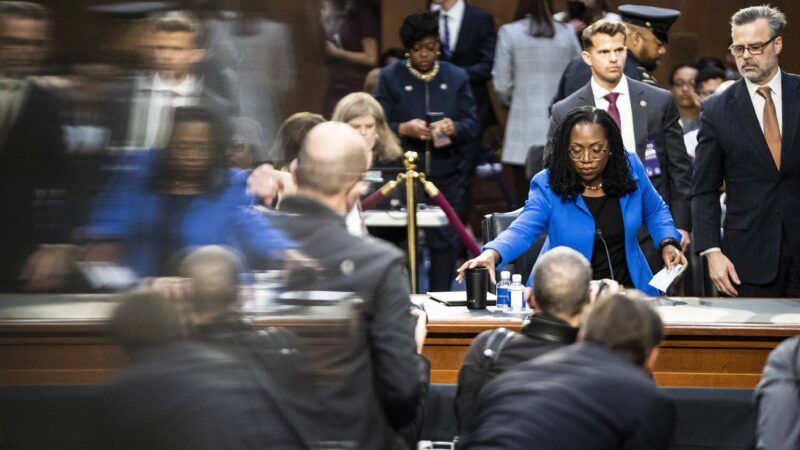When They Attack 'Dark Money,' They're Really Attacking Free Speech
Republicans take a page from the Democrats’ book by crying “dark money” during Ketanji Brown Jackson’s confirmation hearing.

By adopting Democrats' strategy of attacking so-called dark money groups at this week's confirmation hearings for Supreme Court nominee Ketanji Brown Jackson, Republican senators are fueling efforts to undermine core First Amendment protections.
Sen. Chuck Grassley (R–Iowa), the top Republican on the Senate Judiciary Committee, denounced the "role of far-left dark money groups like Demand Justice" in his opening remarks. And he wasn't the only one to do so. Sen. Lindsey Graham (R–S.C.) made vague references to "the most liberal people under the umbrella of Arabella." Prior to the hearing, Senate Minority Leader Mitch McConnell (R–Ky.) criticized the "dark money" being spent to "raise [Jackson's] profile."
Predictably, Sen. Sheldon Whitehouse (D–R.I.) responded to Republicans' dark money fear mongering by suggesting that they support his legislation to "get rid of it." No one should take the bait.
Whitehouse is a sponsor of the DISCLOSE Act, a bill that Republicans in Congress, including all those quoted above, have thankfully opposed because it would force advocacy groups to publicly expose the names and addresses of their supporters. In today's polarized political environment, that would be a recipe for disaster. This legislation, which is regularly included in Democratic voting reform proposals, is a direct attack on the First Amendment right to associate privately.
The American Civil Liberties Union also recognizes the threat, with senior staff writing that these provisions "could directly interfere with the ability of many to engage in political speech about causes that they care about and that impact their lives by imposing new and onerous disclosure requirements on nonprofits committed to advancing those causes."
Armed with donor lists, powerful politicians in Congress could shift the target of their name-and-shame attacks from groups like Demand Justice and the Judicial Crisis Network to the individual Americans who support them. The result would be a loss of donations to groups that speak out, a chilling of political speech, and a shrinking of civil society.
Whitehouse's proposed "solution" would dramatically expand the federal government's power over political speech by redefining many communications about legislation and judicial nominations as "campaign-related" speech. True campaign speech—which calls for the election or defeat of candidates—is already heavily regulated.
Under the DISCLOSE Act, however, a "campaign-related disbursement" would include "a Federal judicial nomination communication," which is defined as any paid communication effort "that is susceptible to no reasonable interpretation other than promoting, supporting, attacking, or opposing the nomination or Senate confirmation of an individual as a Federal judge or justice." Such communications "shall be treated as campaign-related disbursement[s] regardless of the intent of the person making the disbursement."
In plain English, the bill would transform speech about nominations into a regulated form of campaign speech, even if neither a candidate for office nor an election is mentioned. Organizations that trigger the "judicial nomination communication" regulations would have to submit donor lists to the Federal Election Commission, even though judicial nominations and confirmation processes are not elections.
These invasive and misleading disclosure mandates would thrust the judicial nomination process even further into the realm of partisan politics. Organizations that have always maintained a nonpartisan position and have never participated in elections would likely be unwilling to engage in speech that may trigger the bill's provisions. Nonprofits could fall silent because they prioritize their supporters' privacy over their ability to call on lawmakers to support or oppose a nomination.
Partisan campaign groups won't be scared away. They may be the only ones still willing to speak about nominees besides politicians and major media outlets, because they are already legally obligated to expose their donors and comply with other reporting requirements.
The difficulty of complying with those laws and the risks of navigating new, vague regulations will be enough to silence many small groups. Groups that do take on those burdens will likely suffer a loss of donations from Americans who fear retaliation for their beliefs or simply prefer not to be publicly associated with "campaign-related" speech.
The end goal of such legislation is to force any group that speaks about the government to operate like a political action committee—leaving people who support a cause to defend themselves against whatever harassment comes their way. Democrats in Congress have long used the "dark money" smear to avoid engaging with their critics and to gin up support for extreme new speech restrictions. Republican senators, in seeking to turn the tables, risk empowering a movement that puts everyone's First Amendment rights in danger.


Show Comments (119)